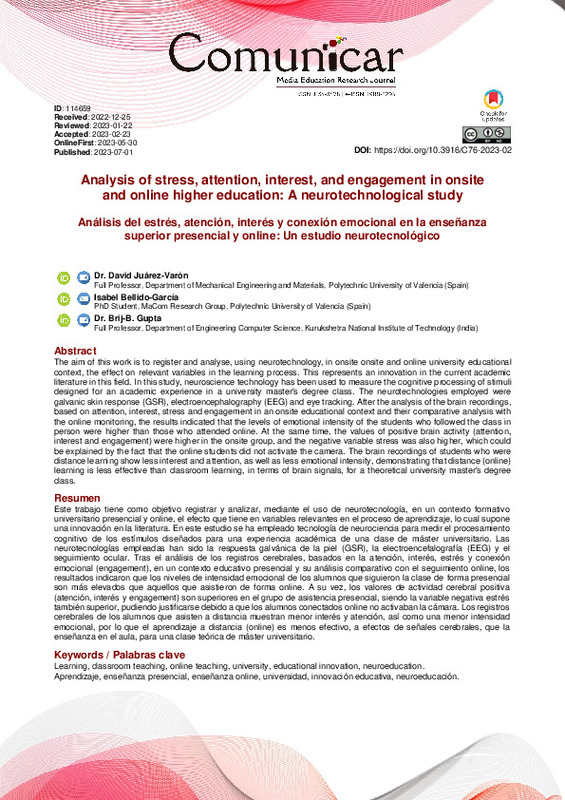JavaScript is disabled for your browser. Some features of this site may not work without it.
Buscar en RiuNet
Listar
Mi cuenta
Estadísticas
Ayuda RiuNet
Admin. UPV
Analysis of stress, attention, interest, and engagement in onsite and online higher education: A neurotechnological study
Mostrar el registro sencillo del ítem
Ficheros en el ítem
| dc.contributor.author | Juárez Varón, David
|
es_ES |
| dc.contributor.author | Bellido-García, Isabel
|
es_ES |
| dc.contributor.author | Gupta, Brij B.
|
es_ES |
| dc.date.accessioned | 2023-12-18T19:04:21Z | |
| dc.date.available | 2023-12-18T19:04:21Z | |
| dc.date.issued | 2023-07-01 | es_ES |
| dc.identifier.issn | 1134-3478 | es_ES |
| dc.identifier.uri | http://hdl.handle.net/10251/200857 | |
| dc.description.abstract | [EN] The aim of this work is to register and analyse, using neurotechnology, in onsite onsite and online university educational context, the effect on relevant variables in the learning process. This represents an innovation in the current academic literature in this field. In this study, neuroscience technology has been used to measure the cognitive processing of stimuli designed for an academic experience in a university master's degree class. The neurotechnologies employed were galvanic skin response (GSR), electroencephalography (EEG) and eye tracking. After the analysis of the brain recordings, based on attention, interest, stress and engagement in an onsite educational context and their comparative analysis with the online monitoring, the results indicated that the levels of emotional intensity of the students who followed the class in person were higher than those who attended online. At the same time, the values of positive brain activity (attention, interest and engagement) were higher in the onsite group, and the negative variable stress was also higher, which could be explained by the fact that the online students did not activate the camera. The brain recordings of students who were distance learning show less interest and attention, as well as less emotional intensity, demonstrating that distance (online) learning is less effective than classroom learning, in terms of brain signals, for a theoretical university master's degree class. | es_ES |
| dc.language | Inglés | es_ES |
| dc.publisher | Grupo Comunicar | es_ES |
| dc.relation.ispartof | Comunicar | es_ES |
| dc.rights | Reconocimiento - No comercial (by-nc) | es_ES |
| dc.subject | Learning | es_ES |
| dc.subject | Classroom teaching | es_ES |
| dc.subject | Online teaching | es_ES |
| dc.subject | University | es_ES |
| dc.subject | Educational innovation | es_ES |
| dc.subject | Neuroeducation | es_ES |
| dc.subject.classification | INGENIERIA DE LOS PROCESOS DE FABRICACION | es_ES |
| dc.title | Analysis of stress, attention, interest, and engagement in onsite and online higher education: A neurotechnological study | es_ES |
| dc.type | Artículo | es_ES |
| dc.identifier.doi | 10.3916/C76-2023-02 | es_ES |
| dc.rights.accessRights | Abierto | es_ES |
| dc.contributor.affiliation | Universitat Politècnica de València. Escuela Politécnica Superior de Alcoy - Escola Politècnica Superior d'Alcoi | es_ES |
| dc.description.bibliographicCitation | Juárez Varón, D.; Bellido-García, I.; Gupta, BB. (2023). Analysis of stress, attention, interest, and engagement in onsite and online higher education: A neurotechnological study. Comunicar. 31(76):21-34. https://doi.org/10.3916/C76-2023-02 | es_ES |
| dc.description.accrualMethod | S | es_ES |
| dc.relation.publisherversion | https://doi.org/10.3916/C76-2023-02 | es_ES |
| dc.description.upvformatpinicio | 21 | es_ES |
| dc.description.upvformatpfin | 34 | es_ES |
| dc.type.version | info:eu-repo/semantics/publishedVersion | es_ES |
| dc.description.volume | 31 | es_ES |
| dc.description.issue | 76 | es_ES |
| dc.relation.pasarela | S\500358 | es_ES |








